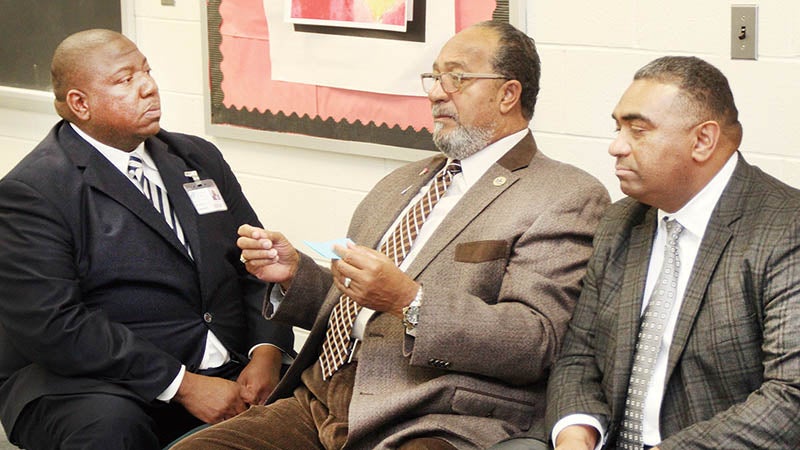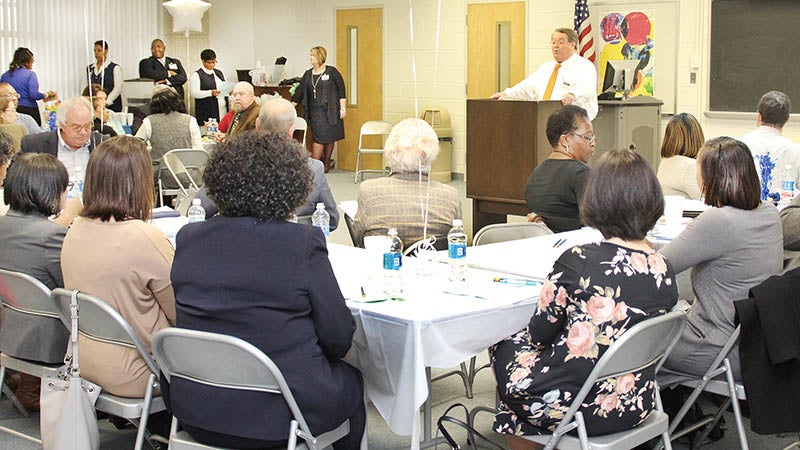Meeting the needs
Published 10:06 am Thursday, January 19, 2017
UNION – Declaring a desire to better prepare their graduates to meet the changing needs and job skills of an evolving society, Roanoke-Chowan Community College (RCCC) hosted civic, business, industry, and education leaders at a special confab at the Freeland Building on the school’s campus Tuesday morning.
“We’re entering our second half-century,” said RCCC President Dr. Jimmy Tate. “We want – and need – to know what you all expect from our college.”
Tate, paying homage to the college’s 50th anniversary that it will celebrate in 2017, declared to the group of some 60 attendees that more than the institution and business and industry being partners, they will have to be such in order to meet the region’s needs.
“We are in the process of re-branding, and as we do we want employers to know that their future employees are right here,” he added.
“We want this initiative to engage schools, law enforcement, local government, as well as business and industry,” Tate continued.
“How can we do better?” he asked. “Jobs are opening up and we have to meet the work force’s needs. So it’s time for us to ask the taxpayers who keep us in business, what do we need to do.”
Dan Joyner, Director of the RCCC Small Business Center, spoke before Tate and told how the college’s business center is designed to serve the educational and training needs of the business community, with an emphasis on small business. Joyner says the Center offers a wide variety of courses, seminars, and workshops throughout the year, many at no charge, and one-on-one consultative assistance is also available, as well as referrals and resource materials relating to small business occupations. The Center’s Entrepreneurship Seminars are free and include topics such as starting a business, writing a business plan, acquiring financing, and even how to research and find customers.
Lauren Dudley, Northeast Regional Director of the NC Works Training Program, NC Community College System in Beaufort County spoke briefly about how the community college’s Customized Training Program provides education, training and support services for new, expanding and existing business and industry in the state through the network of 58 community colleges, serving all 100 counties in North Carolina.
“Our goal is to foster and support three key aspects of your company’s well-being: job growth, technology investment, and productivity enhancement,” Dudley said. “All our training solutions involve working with the management team and customizing the training to meet specific objectives adding to business success. There are some fantastic resources in rural communities.”
“We call it the SWOT analysis,” said Jaime Heckstall, RCCC Director of Occupational Extension/Customized Training Program. “We want them to understand that their businesses need to have access to a highly-skilled workforce, and that’s what we want to provide here. RCCC is here to assist them in developing our local workforce into the talented and qualified employees their companies deserve.”
Heckstall said SWOT (Strengths, Weaknesses, Opportunities, and Threats) will help the college meet the needs of the community. First in its strengths and weaknesses; then in improving the workforce and local economic development; and lastly, the biggest threat is in preventing jobs (personnel) from leaving the area.
“At the college we look forward to establishing a collaborative partnership with these organizations to ensure their success because the success of RCCC is directly tied to its local community,” she noted.
In brochures that tout the Business and Industry training, Heckstall says instruction and mentoring is available. The handout also includes topics such as safety, leadership/supervisory training, Occupational Safety & Health Administration 10-hour Construction and/or Industry Training Course, and other subjects.
“Some of these (businesses) have training needs we may not be wholly aware of,” Heckstall adds. “But we encourage them to please let us know and we may be able to create a course within our curriculum designed just for the specific needs of their particular organization.”
Those in attendance were then divided into six separate networking groups, all from diverse businesses and occupations and chaired by a member of the college’s staff or administration. The group meetings lasted about 15-20 minutes and were followed by a review before the morning’s hour-and-a-half program concluded.
Tate says he plans to schedule the next luncheon in April and hopes for as great, if not larger, turnout.
“We need partnerships like this to grow,” he concluded, “because we are the community’s voice.”



